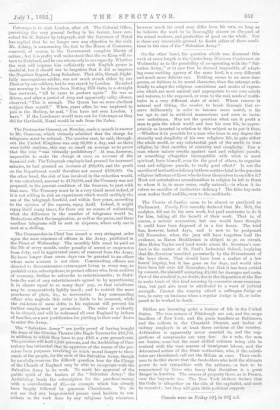On the other hand, the question which was discussed this
week at some length in the Canterbury Diocesan Conference on. 'Wednesday as to the possibility of co-operating with the "Sal- vation Army," or in case that be deemed impossible, of adopt- ing some exciting agency of the same kind, is a very different and much more delicate one. Nothing seems to us more dan- gerous, or dubious in its moral character, than the attempt arti- ficially to adapt the religious convictions and modes of expres- sion which are most .natural and appropriate to our own minds and natures, to the supposed, or even to the real, needs of multi- tudes in a very different state of mind. Where reserve is natural and fitting, the resolve to break through that re- serve deliberately 'in order to become more useful, is far too apt to end in artificial mannerisms and even in insin- cere melodrama. May not the question what can it profit a man to gain the whole world and lose his own life, be appro- priately so inverted in relation to this subject as to put it thus, —Whether it be possible for a man who loses in any degree the sincerity and simplicity of his own religious life, to gain either the whole world, or any substantial part of the world, to true religion, by that sacrifice of sincerity and simplicity. Can. a man whose nature revolts against rant and religions parade, as something altogether incompatible with what is most spiritual, force himself, even for the good of others, to organise rant and religious parade, to really good effect? Is not the sacrifice of instinctive delicacy in these matters fatal to the genuine religious influence of those who do force themselves to sacrifice it ? Must not ostentatious sensationalism in religion be left to those to whom it is, in some sense, really naturel,—in whom it in,- volves no sacrifice of instinctive delicacy ? The false key-note soon makes itself audible, even to the multitude.


































 Previous page
Previous page